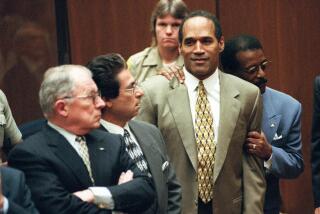Youth Charged in Slaying on Bus Has Troubled Past
- Share via
The path of 16-year-old Robert Johnson seemed all but certain to lead him to the place he finds himself now: a Milwaukee jail, charged in absentia with shooting teenager Corie Williams to death on an MTA bus.
Life pushed Robert part of the way; the other steps he took on his own.
He was 2 when his father went to prison for murder, leaving his mother alone to rear Robert, an older brother and eventually five more boys in South-Central Los Angeles.
Later, Robert watched as his older brother took up with a gang. When Robert was 11, he took his own first step toward incarceration, joining a different group of neighborhood thugs, a family member said. A couple of years later he handled stolen property from a burglary his mother was involved in, which sent her to prison and him to a youth detention facility for less than a year.
When Robert got out at the age of 15, an aunt in Las Vegas took him in, but he went packing two months ago, unable to get along with her husband. That brought him back to Los Angeles in late November to an uncle who remains convinced that the 4-foot-6, 80-pound boy the family nicknamed “Li’l Bob” was trying to turn away from crime and gang life.
Police see it differently.
They are convinced that Robert fired a semiautomatic handgun into an MTA bus Jan. 16, killing 17-year-old Corie, a promising Centennial High School student heading home from classes, and wounding another student. Robert’s gang was embroiled in a dispute with an enemy gang, determined to kill any rival they saw, police said. When an older member of Robert’s gang spotted a rival on board the bus, Robert fired, they said.
Authorities are numbed by life stories like Robert’s. So are residents of crime-infested neighborhoods.
“They expect him to be a corporate lawyer when all he has is nothing?” asks Robert’s aunt, Debbie Singleton. “How they expect him to do right?”
Singleton’s husband, LeVerne Vaughn, says he cannot believe his nephew--who Vaughn said cried for his still-imprisoned mother a few weeks back after an argument with his girlfriend--could kill someone.
“Slowly but surely he was coming up out of that gang activity,” said Vaughn, an unemployed 32-year-old former gang member. “I told him people will try to sweat you or get you into trouble but you’ve got to walk away. He said, ‘That’s what I’m trying to do.’ ”
Police arrested Robert in Milwaukee on Saturday. The Los Angeles County district attorney’s office formally charged him Monday with murder, attempted murder and shooting into an occupied vehicle. (In previous stories, The Times withheld the teenager’s name because he was a juvenile who had yet to be charged.)
A 16-year-old arrested two days after the shooting was also charged with murder and attempted murder for his alleged role in the attack. Robert Pugh, 20, charged in absentia with the same counts for allegedly initiating the conflict, is still at large. The district attorney’s office said Tuesday that it will not charge three other teenagers taken into custody last week because of insufficient evidence on their alleged roles in the confrontation.
Robert Johnson III was born 16 years and one day before Corie Williams died. He was named for his mother’s grandfather, Robert White, a man described by Robert’s grandmother as dedicated to his wife, his 12 children and living an honest farm worker’s life in Dermott, Ark.
In 1983, Robert’s father, Larry Johnson Sr., was convicted of shooting a security guard to death at a Compton check cashing outlet. Robert’s mother, Missouri Hughing, went on to have five more sons, one of whom later died.
Vaughn said his nephew first started getting into trouble when he was 11. If he wanted to play with the other boys in his South-Central Los Angeles neighborhood, he had to join their gang. So Robert did, his uncle said.
Family members said Robert’s mother was arrested for burglary around Christmas 1995. Robert was implicated in the same crime and convicted.
Both of Robert’s parents were still locked up when he emerged from detention, so he went to live with his mother’s sister in Las Vegas. His brothers were scattered about, living with various relatives.
He lasted only few months in Las Vegas before calling Vaughn in Los Angeles and telling him he was unhappy. Robert was not getting along with his aunt’s husband, Vaughn said, and he wanted to leave.
Vaughn’s small, white, three-bedroom house a few blocks away from where Robert grew up was already crowded before Li’l Bob moved in last November. The couple have five children, all younger than 12, and two dogs. Singleton’s niece, a 16-year-old, also has been staying with them.
Vaughn said he offered his nephew a place in his home but also laid down the law: Robert would live by the family’s rules, do household chores, baby-sit the two toddlers, get in by curfew and attend school.
A gang member from age 12 to 18, Vaughn said he told the boy he would not abide any trouble.
He says he told Robert: It might be true you will never really get out of the gang, but that doesn’t mean you have to be part of the gang’s doings. He said he was careful not to be overbearing, knowing he risked losing Robert to the gangs if the boy felt suffocated and rebelled.
“You try to give him his own little space and pray they don’t get in trouble with it,” Vaughn said. “I said: ‘You’re smarter than that. You know how to do right.’ I was hoping he was listening.”
Shortly after the boy arrived in Los Angeles, Singleton said, she went to a nearby public adult school to enroll Robert but was told the winter break was near, and Robert would have to wait until January. Desperate to keep him busy, Singleton asked if the school could offer Robert some type of independent study. She said she was turned down.
Robert spent his time playing with his smaller cousins and joining any kind of pickup game in the neighborhood. He rigged up a makeshift basketball net by punching the bottom out of a milk crate and hanging it on the rear-window security bars of the house. His grandmother said that in his weekly calls to her in Arkansas, he talked about looking forward to school.
Once, when it was his turn to clean the kitchen, Robert went out without doing the job, Singleton said. Just as she had promised him, Singleton grounded him: No going out. No phone calls.
“He was listening,” Singleton said. “He could have just said, ‘You ain’t my real auntie, you just my uncle’s wife and I don’t have to listen to you.’ But he didn’t.”
At each day’s end in the small house, there was a scramble for beds. Luckily, one of the younger boys had trouble sleeping by himself and often bunked with his sister or his mother, leaving room for Robert on one of the white, tubular bunk beds in the boys’ room.
Sometimes, though, Robert would end up on the living room couch. It all depended on how things settled down on a given night, Singleton said.
The day before the shooting was Robert’s 16th birthday. The teenager told his aunt that 16th-birthday parties were girly, so little was done to mark the occasion.
On the day of the shooting, Robert’s uncle wished him a happy birthday because he had not seen his nephew the day before. The incident took place a mile from Vaughn’s home, and with news of the shooting blaring citywide, Vaughn asked Robert about it. The boy said he was not involved.
Three days later, the uncle said, Robert walked out the door, told his uncle he would be back and disappeared.
According to police and family, he bought a $151 bus ticket to Milwaukee, hoping to hide out with his gang idol, Keith Lamar Robinson, 32, who also was arrested in that city when police moved in on Robert.
Last Thursday, the day Vaughn’s house was raided by police looking for the teenager, Robert called his uncle.
“He told me he didn’t do it,” Vaughn said. “I told him to get down here and straighten this mess out.”
Robert’s gang name, “Baby Kiko,” was given to him in honor of Robinson, a.k.a. “Big Kiko”--something Vaughn finds tragic.
“He was named after this somebody,” Vaughn said. “That was his family. They said we’re going to take care of you. This is how they take care of people.” Vaughn said it is possible his nephew was on the corner of Avalon Boulevard and Imperial Highway when the shooting went down, hanging with the wrong crowd. “That’s what I told him--that’s why you in trouble.”
Because Robert is fighting extradition from Wisconsin, police said, it could be four to six weeks before he comes back to Los Angeles.
“He would have had it,” Singleton lamented. “He was on his way to school, he was in a house with a family telling him how to do. If only someone would have told me before, I could have prevented it. I could have kept him in the house 30 more minutes or made him ride with me to the store. If only I could have predicted the future.”
More to Read
Sign up for Essential California
The most important California stories and recommendations in your inbox every morning.
You may occasionally receive promotional content from the Los Angeles Times.










